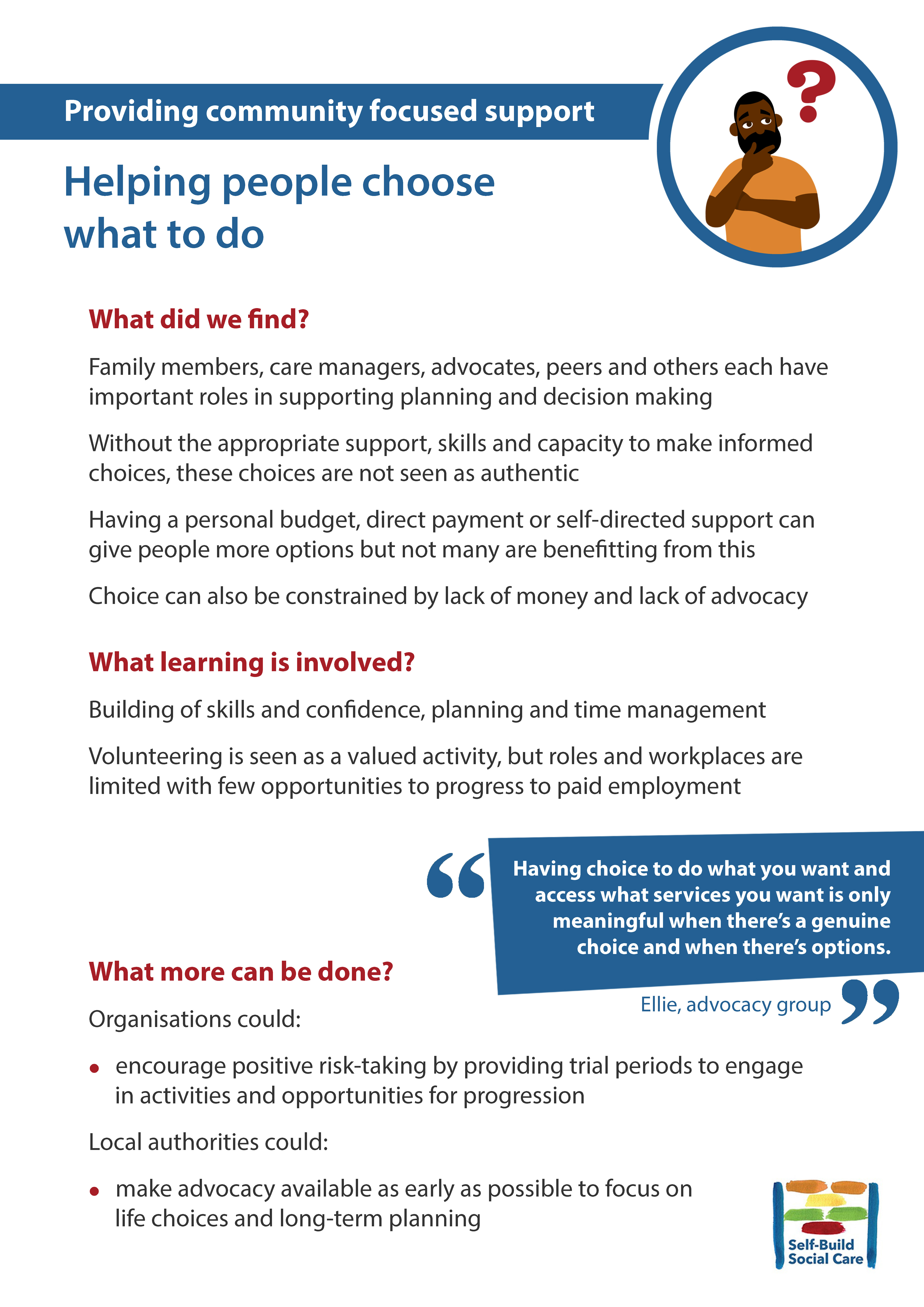Helping People Choose What To Do
"People often don't have choices’"
Staying busy and occupied in activities that are meaningful and engaging is an important aspect of self-building a life. But making these decisions can be difficult due to people’s skills and confidence, constraints on their time and routines, and information often not being readily available.
Policy in the UK and elsewhere has promoted paid employment for people with learning disabilities as the key route to achieving ‘social inclusion’ for two decades. And yet, employment levels remain extremely low and have changed little in response to policy initiatives. Statistics also support the idea that higher unemployment increases in tandem with level of impairment.
Rather than seeking to find activities that aim to place people with learning disabilities in paid employment, our research looked at all forms of participation, including those that bypass the competitive labour market such as volunteering. We also looked at other activities that were meaningful, such as engagement in social activities and mentoring, as we cover in other sections.
The organisations we included in our research were seeking to help people choose what to do and to co-produce activities that were meaningful to the participants. Many individuals and organisations provide support to people when they are seeking to make choices about activities they would like to do, including family members, care managers, advocates, and peers. In some cases, family members make decisions on people’s behalf. People from organisations noted that in some cases options do not exist or choices have to made by others.
"People often don't have choices. They probably do more now, and in the community obviously they’ve got more of choices of where they would like to live. … But you can see why the choices are made for some people, 'cause it is a necessity they need support 24/7, and couldn’t manage safely in the community" (Karen, Care manager)
And support to take decisions can sometimes be constrained due to limitations in number or duties of staff (at a resource centre or supported accommodation).
Choice is commonly used term; the notion of real or ‘genuine’ choices was identified.
"Having choice to do what you want and access what services you want is only meaningful when there’s a genuine choice and when there’s options, and I guess with a lack of options then that becomes less meaningful" (Ellie, Independent Advocacy)
There aren’t always enough options for people to make choices about what they want to do, even if they have a personal budget (although having a personal budget or direct payment can give people more options in some cases). In addition, if people don’t have the support, skills and capacity to make informed choices, then it is not real choice.
However, from the people we interviewed, we found that current volunteering activities were largely restricted to limited cultural roles, such as sorting clothes in the back of charity shops. Many people’s volunteering roles had not been extended into delivering a wider range of public and social services yet. That said, volunteering still remains a valued and important goal for people.
Some activities were in the local community, such as ‘men’s sheds’ projects, with access facilitated by advocacy organisations. People liked being involved in activities they saw as meaningful. Taking part in community-based groups could make what people were doing more meaningful.
One interviewee from an advocacy organisation reflected on their role, noting that in an ideal world their support would not be needed. However, this role will be needed for the foreseeable future.
"Ultimately if we could make ourselves redundant, that would be great because … that would show that people with learning disabilities have got a great life. I suppose if you want to say, that’s my vision, it would be that we’re not needed. That would be my vision. That actually people with learning disabilities are speaking up, they don’t need us, and so and there’s stuff going on in the community, we can go home and do something else. That would be my vision but sadly I think we’re a little bit away from that."
What learning is involved?
The only authentic way to learn how to make choices is to take them and see what happens. This means that options need to be available. Developing confidence and trust in the safety-net of support networks underpins positive risk-taking for individuals and groups. We found there was considerable interest in learning from positive examples though sharing the findings of this study.
What more can be done?
Making advocacy available as early as possible can help to focus on choices that help prevention, rather than having to address problems that result from an absence of choices or involvement in activities. Who can?? use technology to increase the awareness of opportunities.






